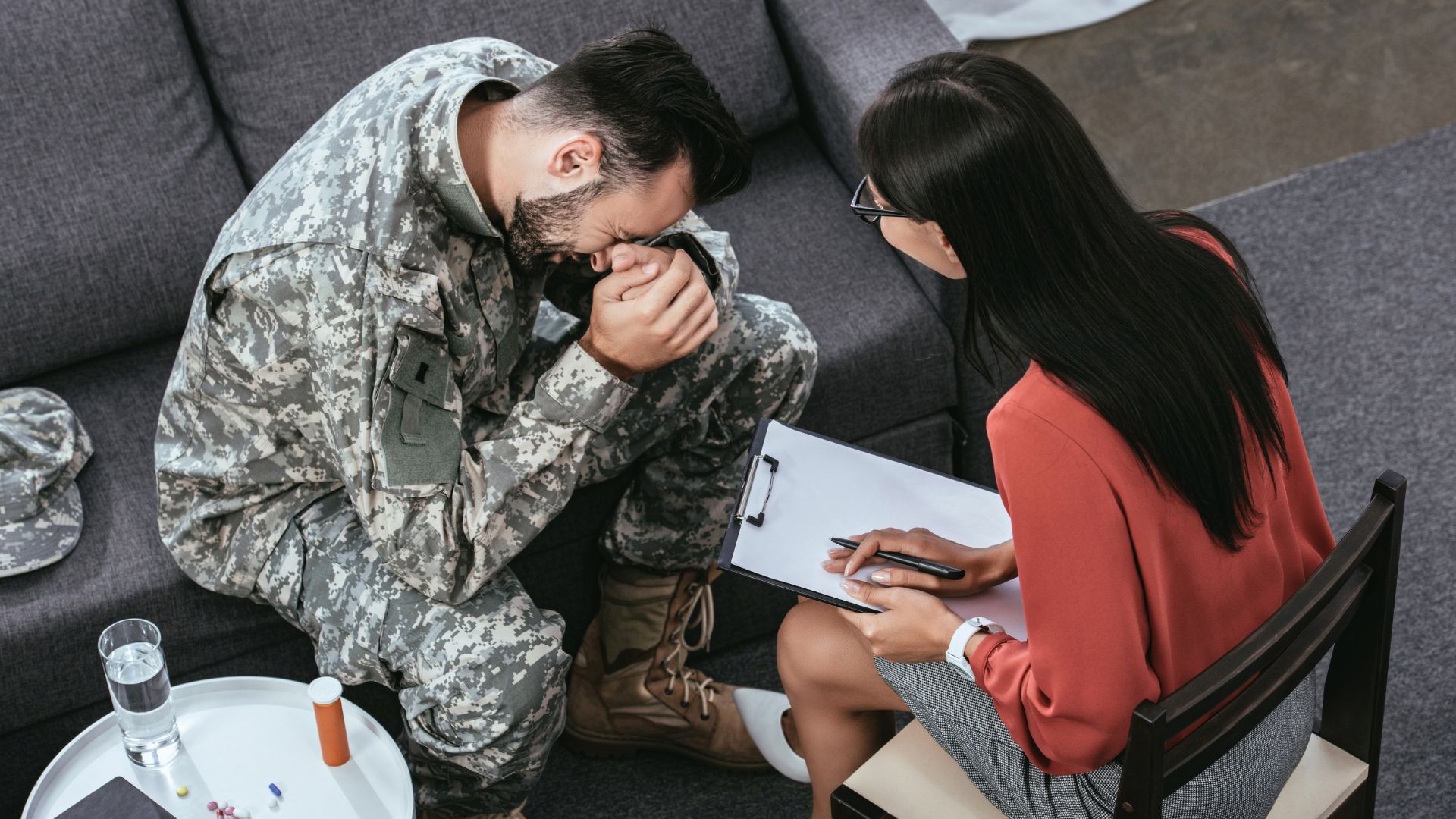If you know someone who has PTSD (Post Traumatic Stress Disorder) then you are aware of how they can be during heightened moments of stress when they are experiencing emotional and physical discomfort such as extreme irritability and personal space issues. Trauma survivors will go through different stages as they manage their own mental health issues.
As their loved one, you need to know what these triggers can be and what to do when someone with PTSD pushes you away during these moments.
Suffering from a traumatic event is not something that needs to be brushed over, and as long as a trauma survivor has a strong support system within their personal relationships, they will be able to move through the healing process in the best way possible for them.

PTSD Symptoms
Post traumatic stress disorder will present itself differently for all people. Some will get more symptoms than others depending on what they went through and how they were able to manage.
This does not mean that one is worse than the other at all. It is important for a PTSD sufferer to know that what they are feeling is valid and that they deserve as much support as possible to help them get through.
When someone with PTSD is in a sympathetic nervous system state and they are coming across as angry or has a need to shut you out and run away, you need to accept that you are not going to be able to stop them at this time, and all you can do is let them know that you are not going anywhere and that you will be there for them.

Common Symptoms of PTSD
Mental health professionals have noted the posttraumatic stress symptoms that people should look out for so that PTSD sufferers and their support systems can know what to do when a flare-up happens.
- Vivid flashbacks
- Intrusive thoughts of traumatic events
- Intense distress when remembering the traumatic event
- Sleep problems – having nightmares
- Problems with pain, sweating, and nausea
- Issues with physical intimacy – pushing people away,
- Drug/alcohol abuse
- Extreme anxiety and/or an emotional outburst at people
The list can be endless in these cases, as people will respond in a variety of ways to their trauma as they try and cope with the feelings they have inside. Reliving any traumatic events can illicit strong emotions that can present in extreme and destructive ways, whether they are overt or quiet.

Helping Someone With Post Traumatic Stress Disorder
There are steps to take to help trauma survivors during their time of need. People with PTSD can be aware that they are pushing people away, but getting out of that pattern can be a difficult road to walk down, so you need to meet them at least halfway. This type of mental illness is not going to go away quickly.
You should be there to support someone who’s struggling, letting them know you’re there no matter what. In most cases, a mix of being emotionally present, getting the right recovery methods (similar to ibogaine ptsd treatment), and joining support groups can all help them rebuild trust and work on healing their relationships with their loved ones.
In recent years, research into psychedelic therapies has shown promising results as well. Small studies on MDMA-assisted psychotherapy and ketamine therapy have demonstrated effectiveness for some PTSD patients by allowing them to reprocess traumatic memories from a different emotional perspective. When combined with counseling, these therapies may facilitate recovery by strengthening neural connections dampened by past trauma. In this regard, you can do a web search using terms like “ketamine therapy near me” and find qualified medical professionals or licensed clinics offering these treatment modalities.
While still considered experimental, psychedelic-assisted treatments are part of a growing conversation around innovative ways to approach PTSD and heal relationships damaged by trauma’s lingering impact. A compassionate, non-judgmental space for trauma survivors to process painful memories, and integrate past and present self-concepts is the ultimate goal, regardless of the methods used.

Reach Out to Them
When someone with PTSD pushes you away, it can be a challenging situation to navigate, but reaching out with empathy and patience can make a significant difference. Understand that their actions might stem from their struggles and the emotional weight they carry. Instead of taking their withdrawal personally, offer your support and let them know you’re there whenever they’re ready to talk. Sometimes sending a simple, non-intrusive message or an occasional gesture can convey your care without overwhelming them. In cases where you’re genuinely worried about their well-being and are unable to establish contact, professionals similar to Bond Rees Detectives can assist in locating them discreetly. Remember, your understanding and persistence can play a pivotal role in helping them feel less isolated and more supported during their journey toward healing.
Listen to Them
PTSD sufferers can find it hard to open up and have that emotional closeness with someone when they have gone through a traumatic experience. It is important that you do not pressure them into speaking and opening up. It is their own life, and they need to go at their own pace.
Whether you are a romantic partner or a family member, you can’t force them to open up to you. Let them know that whenever they are ready to speak, you are there for them. It may take them a while to take you up on that.
They are a trauma survivor, they may feel like they can only rely on themselves.
Don’t Act Differently
Be normal with them, don’t stare at them constantly or keep going up to them to ask how they are doing. You’ve said your piece and now you need to give them space to minimize stress. If you remain calm and carry on, they won’t feel like they have to open up to you.
The negative feelings they are going through will only come out on you if you keep badgering them for an answer. They will clam up and push further away from you. Let them have their alone time and trust that if they need you, they will come to you.

When They Come To You
If they do eventually come to you to talk, even a few days later after you initially spoke to them, make time to speak. Go somewhere quiet and calm and let them talk, don’t interrupt or offer them unsolicited advice, that won’t help the situation.
When someone with PTSD pushes you away and they finally want to open up again, now is the time to take in what they are saying.
Educate Yourself On PTSD
If you do not know much about PTSD and you are dealing with someone who has it, it would be a good time to look it up and read about what it is and how it manifests itself in individuals.
If you know a little bit about the traumatic event they went through and you want to find specific help for that problem, speak to mental health professionals as well as other sufferers, or read up on the literature surrounding it.
This will help, and it shows that you care and that the sufferer’s own support system (you) is willing to do what they can to understand these traumatic experiences. If you have never suffered from PTSD personally then educating yourself is a must.

Creating Routines
Routines can be very good for people with PTSD. If you live with the person, then you can help them get into a routine that will provide them with a lot of support. You can get them to eat properly, exercise regularly, and deal with their physical discomfort during flares.
Fight or Flight
We all have a fight or flight system within us, but people with PTSD are constantly in that mode which can wreak havoc on their bodies to always be on edge, just in case. If they don’t have a routine, or something disrupts their routine, this has the potential to flare them up and cause them to freeze.
This reaction is classed as a dorsal vagal response within the parasympathetic nervous system as the Recovery Harmony Center states. People feel like they are unable to move once they suffer that threat.

Note Any Triggers
If you see someone go through this, you need to take note of their symptoms and how they are reacting, then consult with a medical professional to go over what you can do at that moment that will not exacerbate the issue.
Think about what led them up to this moment, and what triggered them to have this response to stop any future trauma from occurring. If it is to do with something they have seen, or smelled, a person, the news, and so on. Remove them from that situation and get them somewhere safe and free from these distractions.
Seek Treatment
A trauma survivor’s nervous system has gone through a lot, they are always on high alert and will experience issues that people can’t outwardly see such as sexual intimacy/sexual frustration, long term memory blockage, low impulse control management, and so on. This can become worse as time goes on without the necessary help.

Find Someone Reputable
Researching different therapists that handle a variety of PTSD issues can help not only them but you too, as you will be able to support them as they progress.
They may need anger management or assertiveness training, maybe even couples counseling, whatever it is, getting them the help now with the right professional will aid them in working through their feelings and any other medical issues they may have.
Conclusion
Dealing with someone who has PTSD is not easy, they are a trauma survivor that is reliving their trauma daily, and as their loved one or friend, all you can do is be there for them and support them when it is necessary. It’s scary and unpredictable, but they won’t suffer forever with you by their side.
Take into account their physical needs, their past experience, and their trust issues, and be the person they needed when they were going through it. You are lucky to have each other.




